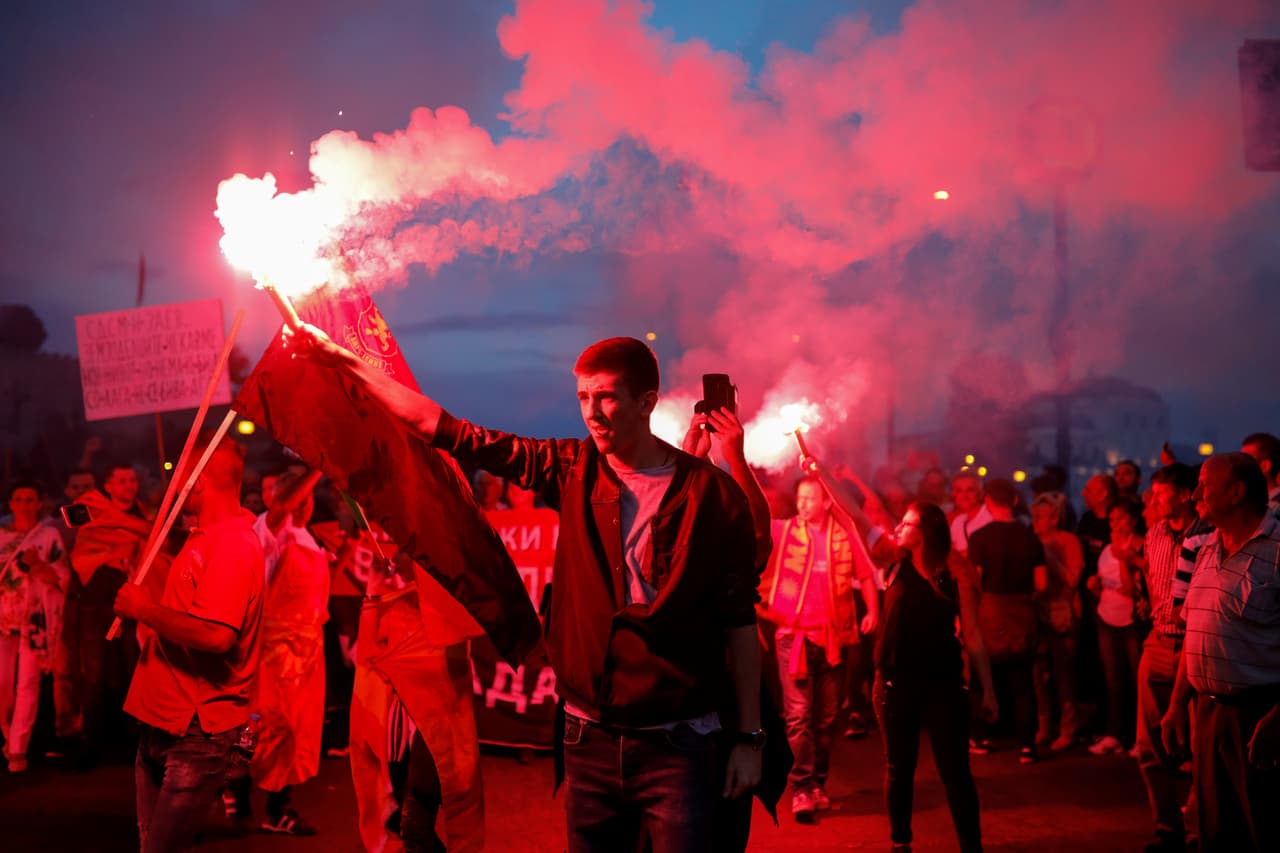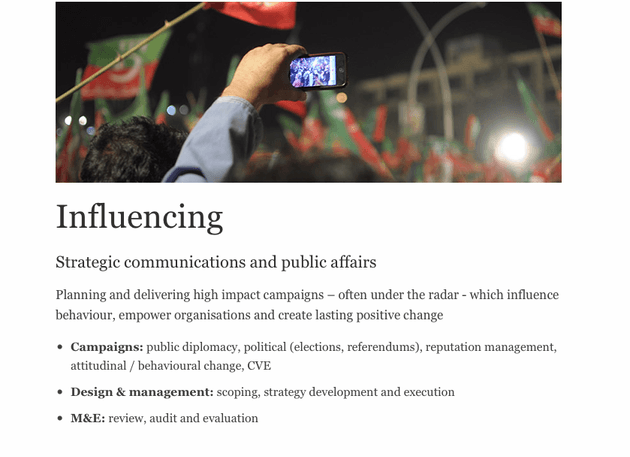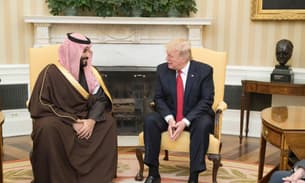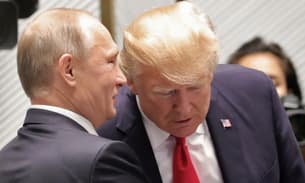
Russian warriors and British PR firms: Macedonia’s information war
What’s in a name? On Sunday, Macedonia will hold a referendum on whether or not to add the word ‘North’ to its name. While to the casual observer it may seem a fairly insignificant change, it is one that has catapulted the tiny Balkan state onto the international stage and sparked an information war.
For the Macedonian government, the name change would bring an end to a 27 year long dispute with Greece - a dispute that that has prevented Macedonia joining Nato and the European Union. For Russia, Macedonian membership of Nato and the EU would signal its influence in the region is further diminishing.
And so, the name change poll has become the latest frontline in a battle of influence being played out in referendums and elections across the globe - a battle that often crosses the east-west divide and is increasingly fought under the radar. On one side are Russian information warriors, it’s alleged, while on the other, the Bureau can reveal, are commercial spin doctors ready to deploy 21st century tactics.
In recent weeks, world leaders have descended on the Macedonian capital of Skopje rallying behind the referendum. US Defense Secretary James Mattis used his visit to warn of a Russian disinformation campaign aimed at undermining and derailing the name change campaign. Moscow stands accused of having hired protestors and attempting to bribe officials.
But the Russians are not the only ones who have sought to launch influence operations in Macedonia, the Bureau has discovered. The Bureau has learned that one British PR firm which says it specialises in “under the radar” operations to influence voters is working for the Yes campaign in Macedonia and is receiving Foreign Office funds for its work there. We also discovered that another British-based PR firm offered services to support the name change which included a plan to create misleading social media accounts to “infiltrate and divide the opposition”.
The interest of Western PR firms in the Macedonian referendum underscores how the polarisation and unpredictability of the current political climate is turning even obscure countries into targets for influence operations specialists in both the East and the West.
“Set-piece democratic events – most notably elections and referendums – are subject to increasing hacking, gaming and attempts at digital distortion,” said Martin Moore, director of the Centre for the the Study of Media, Communication and Power at King’s College London. "There are lots of reasons why we’ve seen the increase, the most significant being the dominance of transnational tech platforms that are powered by ad tech."
The battle for influence
The conflict over Macedonia’s name goes back more than two decades, and for the populations of both countries is an explosive issue tied to national identity and pride. Since Macedonia split from Yugoslavia in 1991, Athens has maintained that the country’s name implies territorial claim to Greece’s northern region, which is also called Macedonia. Its anger over the issue has led it to consistently block Macedonia’s attempts to join Nato and the EU.
But on June 12, the two countries prime ministers came to a deal - Macedonia could be rechristened ‘North Macedonia’. On Sunday, Macedonians will be asked to say yes or no to the proposal.
There are still further steps - even if the public votes yes, the agreement will still be subject to approval by both parliaments. And ever since the agreement was announced, protestors have poured onto the streets bringing with them a nationalistic fervour.
Some Macedonians see the possible name change as a challenge to their identity. And even the country’s president is not on board - he is urging the public to boycott the referendum. A 50 percent turnout is required for the vote to be valid.
Soon after the protests, the Macedonian government accused Russia of bankrolling them, with the prime minister claiming there were multiple reports Greek businessmen “sympathetic to the Russian cause” had paid Macedonians amounts ranging from $13,000 to $21,000 to “commit acts of violence”. BuzzFeed reported that this turned out to be part of a much bigger scheme that allegedly saw “hundreds of thousands of dollars distributed to Macedonians politicians, nationalist organisations and soccer hooligans” in efforts to derail the vote.
Meanwhile, Western diplomats told the New York Times that 40 new websites are popping up each day on Facebook encouraging Macedonians to boycott the referendum. The sites originate from outside the country, and diplomats have said they mirror a pattern of what is believed to have been Russian interference in other elections.
Western support has flooded in as new concerns over perceived Russian interference have spread. “We do not want to see Russia doing there what they have tried to do in so many other countries,” US Defence Secretary General James Mattis told reporters travelling with him on a trip to Skopje. “No doubt that they have transferred money and they are also conducting broader influence campaigns.”
The US Congress allocated large sums of money in January 2017 to fight Russian disinformation campaigns following its own scandal over alleged Russian influence in its 2016 presidential election. This included $8 million specifically for Macedonia, with a deluge of fake pro-Trump news churned out during the election campaign traced back to one of the former Yugoslav republic’s sleepy riverside towns.
An investigation by the Bureau has now established that British consultants have also sought to get involved in Macedonia. In a proposal dated March 18, 2018 seen by the Bureau, London-based PR firm Gabara Strategies offered to help the Macedonian government win the argument. The proposal, whose authenticity was verified by Gabara’s founder and president, Ivo Gabara, included a raft of conventional measures such as making sure the two governments made a joint statement.
But it also included a section on setting up supposedly opposition social media groups which would actually be under the company’s control to “channel, infiltrate and divide the opposition”. In June, Mr Gabara told the Bureau that the Macedonian prime minister “had agreed to the proposal in principle and asked for the proposal to be redrafted”.
He now says that the project did not proceed. The Macedonian government also denies any knowledge of such an operation.
Mr Gabara told the Bureau: “We did not suggest the creation of fake opposition sites nor is this our practice. We had proposed the creation of genuine but controlled channels for negative sentiment to be expressed and defused.”
He continued: “By glossing over 99% of the positive and transparent work outlined in our proposal and focusing on a single line which, taken out of context, the BIJ interprets in the worst possible way, you are misinterpreting our approach”.
Gabara Strategies is not a member of the Public Relations and Communications Association (PRCA), which represents PR firms in the UK. However, the agency’s Director General Francis Ingham said this practice, which he described as astroturfing - “essentially a fake grassroots movement” - was “completely contrary to the PRCA Professional Charter which governs the behaviour of our members”. Ingham added that “ethical practice has never been more important.”
The Bureau also discovered that a British PR firm called Stratagem International is employed by the Macedonian government to assist the Yes campaign, and that the British Foreign Office is helping fund its work. Stratagem International claims on its website to be in the business of "delivering high impact campaigns - often under the radar - which influence behaviour", listing elections and referendums as examples of the work they do.
 A screen shot of Stratagem International's website
A screen shot of Stratagem International's website
A Foreign Office spokesperson said: “The UK is funding a small number of independent experts to offer technical advice in support of the referendum. They are a resource for the referendum task-force”. The impression given was that this was just impartial technical help in setting up the referendum. Our communications with Stratagem however established that this was not the case - the company said the FCO had funded its work on Macedonia, saying “Stratagem International is a resource for the referendum Taskforce (Yes Campaign).”
An industry brought into disrepute
The office of Gabara Strategies sits on an affluent street in London’s Marylebone district, a stone's throw away from the BBC’s headquarters. When the company moved to London some years ago, it joined a cluster of PR firms that operate from the city, many doing the bidding of powerful forces attempting to influence the outcomes of referendums and elections at home and across the globe.
It’s a booming business. From the 2022 bid for the world cup to the referendum on Macedonia’s possible name change, countries and companies have seen opportunities and tried to play a hand in the results. They have often used sophisticated social media tools to push their agenda, and, as in Gabara's case, offered to create websites and a social media presence which would appear to have been created by the public.
But it is these kind of tactics that many feel have brought the industry into disrepute. Another London-based PR firm went into administration last year after being ejected from the PRCA - the trade body which regulates the industry for likely fuelling racial tensions in South Africa. Bell Pottinger had been employed by a firm owned by the wealthy Gupta family in South Africa. As part of that contract, it allegedly spawned a campaign that sought to further divide the country along racial lines. Fake Twitter accounts were set up to push the message that opponents of Guptas and their close ally President Zuma were agents of “white monopoly capital”. While it touched on some real issues in post-apartheid South Africa, some say the campaign has set race relations in the country back over a decade.
When presented with our findings on Gabara’s proposal to the Macedonian government, the PCRA’s Francis Ingham said: “Agencies should bear the Bell Pottinger example in mind when choosing who to work with; and clients in turn should hear alarm bells when their agencies chooses to be outside the industry’s self-regulatory framework.”
Main photo: A protest against the name change deal in Skopje, Macedonia, June 2, 2018 (REUTERS/Marko Djurica)
Got a Story?
We welcome tip-offs from the public and we always protect our sources
Find out how to work with us




